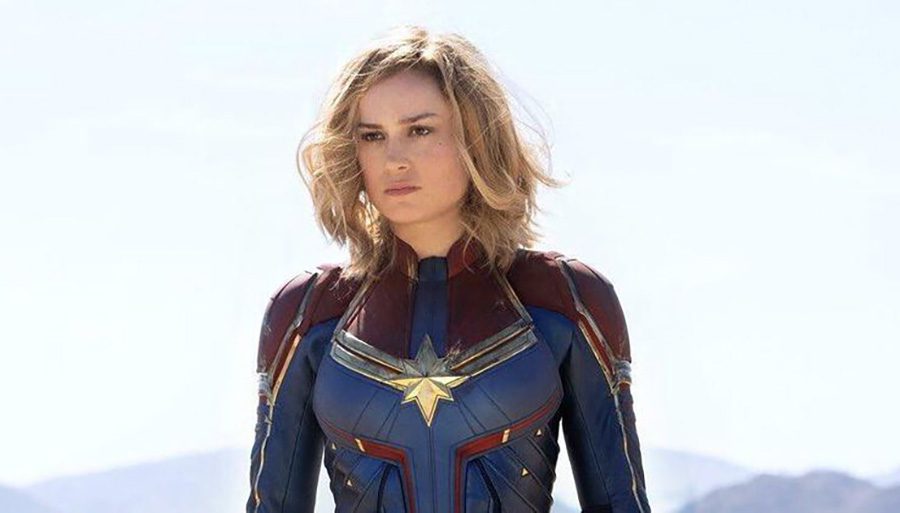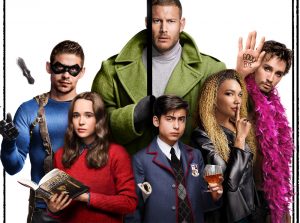The successes and failures of ‘Captain Marvel’
Marvel’s box office behemoth was not its best work
Carol Danvers, Air Force pilot turned superpowered warrior, saves Earth from an alien invasion in Marvel Studio’s latest box office success, “Captain Marvel.” This addition to the MCU was a great movie, but not the best it could have been due to some weak writing errors.
March 12, 2019
“Captain Marvel” hit theaters last week with a phenomenal opening weekend box office of over $450 million. Rising above petty controversy about female superheroes, the newest MCU film was an exciting origin story that generally lives up to the hype, with room left to improve.
Brie Larson plays Carol Danvers, a fearless, wisecracking Air Force pilot who fights as an alien warrior after losing her memory and gaining incredible superpowers. Without knowing about her life on Earth, Carol fights for the Kree (the same alien race seen in “Guardians of the Galaxy”) against the villainous Skrulls, a race of shapeshifters who infiltrate and conquer unsuspecting planets. Captain Marvel’s breakout origin movie takes place in the 1990s, when she crash-lands on Earth and teams up with a young and optimistic Nick Fury to uncover her past and stop a Skrull invasion.
The result is a classic fun and action-packed Marvel movie. Nick and Carol’s confident and humorous personalities create no shortage of funny moments as they swap banter throughout their adventure. Their chemistry on screen feels natural despite their rushed meeting and its high-stress circumstances. Their interactions with the Kree super-team, other S.H.I.E.L.D. agents, and even the Skrull leader, Talos, are often hilarious.
Joining Brie Larson and Samuel L. Jackson are Jude Law as the head Kree warrior on Carol’s team, Annette Bening as Mar-Vell, Lashana Lynch as Carol’s friend Maria, and Clark Gregg as Agent Phil Coulson. Across the board, this is a superbly talented cast. Ben Mendelsohn in particular delivers a standout performance as Talos, who definitely earns his place as a memorable Marvel villain.
“Captain Marvel,” however, struggled to stand apart from the other Phase One Marvel movies. Telling a fresh origin story required a new approach, and directors Anna Boden and Ryan Fleck created a decently new movie-going experience through the memory loss storyline. For Marvel films, this was a first, and Carol’s journey to uncover her past is packed with creative plot twists that really make the back half of the film a substantial improvement from the first half.
For the most part, the CGI use in “Captain Marvel” created bright and appealing visuals, particularly concerning Carol’s power set. The scene where she gains her abilities is almost beautiful. Seventy-year-old Sam Jackson looks like a young man through some impressive de-aging technology. The Skrulls’ CG shapeshifting isn’t half bad either. There are some scenes that take place inside a fully-CGI environment that come across as cheesy, but it’s never as bad as the messy final fight from “Black Panther.”
Another error that keeps “Captain Marvel” from reaching excellence is an occasional lapse in the script, which goes from quick quips and intelligent dialogue to a fifth-grade childish mess.
Particularly at the beginning of the movie, Carol’s exchanges with Jude Law’s character are difficult to watch, as their conversation is the same recycled “control your emotions” garbage we’ve seen in cinema for over a decade. Later on, Lashana Lynch’s character delivers a quasi-emotional speech to Carol that was clearly intended to be a moving moment but instead fell flat.
A major detractor for many were the plot holes this movie left in its wake. The biggest is the mystery of Nick Fury’s pager. At the end of “Avengers: Infinity War,” as Nick Fury turned to ash, he whipped out an interstellar pager and called Captain Marvel for help. Spoiler alert, this film introduces that same pager at the end, as Carol gives it to Fury.
But what “Captain Marvel” fails to do is answer one of the fans’ biggest questions going in to watch it: why didn’t Fury call Captain Marvel during “The Avengers”? Or in “Avengers: Age of Ultron”? Or at the start of “Infinity War”? Why did he wait until his own death? It’s a glaring plot hole that could have easily been answered by some intelligent story writing and a quick piece of dialogue, but instead of facing the issue, “Captain Marvel” wholly ignores it.
Whether you’re on the hype train for “Avengers: Endgame,” a fan of Captain Marvel, or looking to spend two hours on an interstellar trip to the ’90s, “Captain Marvel” is the film to see. The film is far from a modern marvel, but it’s undeniably a critical and financial success.








